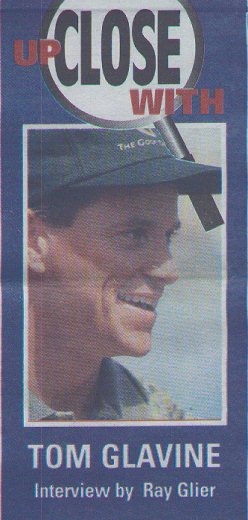
Q:When did you first think about the big leagues and being a pro?
A: I probably had the dream right around the time I was old enough to start playing. Watching baseball games on TV, then finally being old enough to play in Little League really started me dreaming. It was something I wanted to do, but that young you don't know the reality of it. I was probably seven or eight years old.
Q: When did you think you had a chance to play big league baseball?
A: Probably my junior year in high school. Every game there were 15 guys behind home plate with a radar gun. I knew somebody was interested. It was my high school coach who made me realize I had an opportunity. He had colleges calling him, then the scouts started calling.
Q: Were you thinking only about baseball or was hockey a factor?
A: It never crossed my mind that I was going to give up one sport or the other until it was time to start deciding on colleges. I was not ready to give up either one until the day I got drafted (by the Braves) and had to make a choice of profession.
Q: Did you always have that good inner confidence as an athlete?
A: I always had a lot of confidence and a lot of that comes from knowing the talent of everyone else you're playing with. On a local basis, you always compare yourself with the guys you're playing against, and you might have better talent, so that helps your confidence. Even so, you wonder how good kids are everywhere in the country compared to where you are, and that's the thing you never know.
Q: There a lot of good athletes out there. How did you get to be a major leaguer pitcher and Cy Young Award winner? What else did you have working for you besides talent when you were growing up?
A: Of course, athletic ability is a big key in anybody being a good athlete. I guess the things you do to make yourself better, like paying attention to the things going on during the course of a game; paying attention to the things you do well and the things you don't do well; listening carefully to coaches. The key is putting yourself in position to do the things you do well and making those things have more of an outcome on the game than the things you do poorly.
Preparation is a big thing, knowing what you're capable of doing, what you're not capable of doing. You have to be prepared to help yourself so that when you have an opportunity to help yourself, you're ready to do it and it's not a surprise.
Q: Where did you get your competiveness?
A: I just always wanted to be good at whatever I did. I was the type of kid that no matter what it was, if somebody put it in front of me, I wanted to be good at it. It didn't matter if it was going out on the mound nd pitching, or if it was practice where the coach is going to hit me 50 ground balls to see how many I can catch. I wanted to catch all 50 of them.
Q: When you're not playing baseball, what do you like to do besides golf?
A: I like to spend a lot of time with my daughter (3-year-old Amber) and just relax. We do whatever she wants; she runs the show. In the summer time, she loves to be in the pool, so I'm out there with her in the pool. She likes to go to the park and play on the swingset or ride her bike in the driveway. I'm along for the ride.
Q: You do work for the Georgia Counsil on Child Abuse and the Georgia Transplant Fund. Why those two?
A: The Georgia Council on Child Abuse approached me in the late 80s and early 90s, when I had gotten my feet on the ground and was comfortable enough with what was going on on the field that I wanted to start doing some things off the field.
When you sit down and talk to the people at the Foundation, you realize the magnitude of the problem. There's nothing worse than a kid who has to deal with a thing like child abuse. It's one thing to deal with a kid who is sick, but child abuse is another thing. It's something I felt strongly about, so I wanted to help and diminish some of the problems.
Q: How serious were your knee and ankle problems? Why did you have the surgery now?
A: I've been playing with a bad ankle probably for two years, and my knees have really bugged me on and off for the last two or three years. Really, nothing was getting worse, but it had gotten to the point where I said, 'All right, enough is enough. I might as well get something done before it gets out of hand.' You hope when you get it cleaned out, you won't have any problems from here on out. I would describe it as a tuneup.